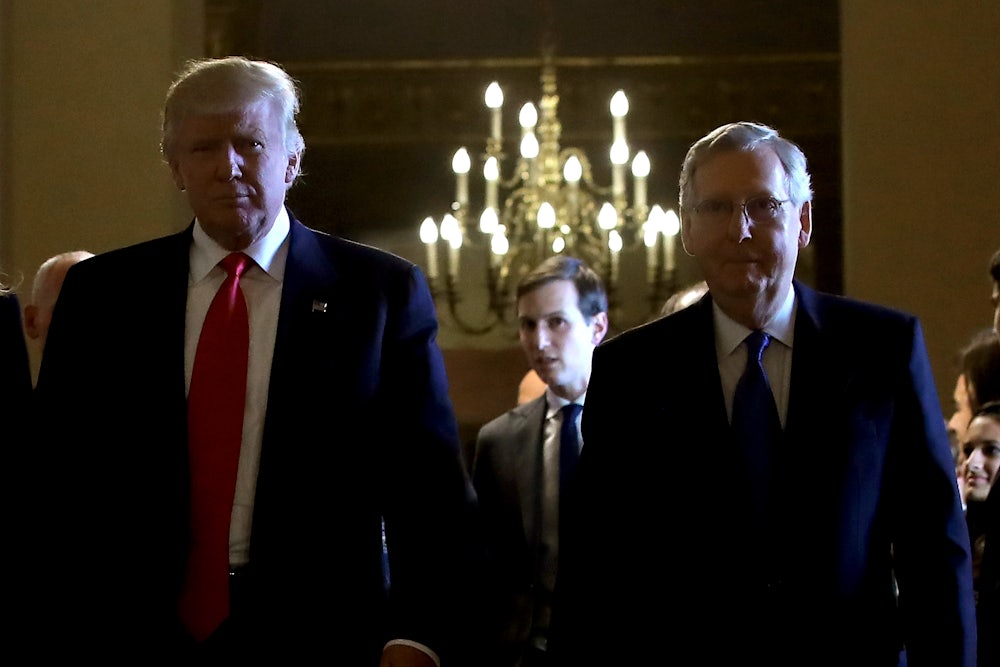Rutgers professor Ross Baker was vacationing in Spruce Head, a tiny village on Maine’s Penobscot Bay, when word reached him that President Donald Trump was attacking Senate Majority Leader Mitch McConnell on Twitter.
Can you believe that Mitch McConnell, who has screamed Repeal & Replace for 7 years, couldn't get it done. Must Repeal & Replace ObamaCare!
— Donald J. Trump (@realDonaldTrump) August 10, 2017
Mitch, get back to work and put Repeal & Replace, Tax Reform & Cuts and a great Infrastructure Bill on my desk for signing. You can do it!
— Donald J. Trump (@realDonaldTrump) August 10, 2017
It was a stunning attack by Trump on the single most important legislator for kickstarting his stalled agenda, and it all stemmed from the news that McConnell had said in a low-profile speech Monday in Kentucky, “Our new president, of course, has not been in this line of work before. I think he had excessive expectations about how quickly things happen in the democratic process.” In Washington, Trump’s broadside left Republicans bewildered. “This makes about as much sense as sidelining Tom Brady because you didn’t like his answer at a news conference,” a senior GOP aide told Politico. “The reality is both men need each other to succeed.”
Baker, whose books on Congress include Friend & Foe in the U.S. Senate, racked his brain: Had a president ever been so openly critical of his party’s Senate leader?
“Without actually making a detailed search, certainly in terms of the openness and highly critical nature of the remarks, this is without precedent in modern times,” Baker told me. He marveled at the “real acerbity” of Trump’s tweet. “It’s really quite, quite pointed,” he said.
And yet, not completely unexpected either.
“At one level, it’s not surprising to me,” Norm Ornstein, a scholar at the American Enterprise Institute scholar, told me. “This is a guy who’s not going to accept blame for anything himself.” The co-author of It’s Even Worse Than It Looks: How the American Constitutional System Collided with the New Politics of Extremism, Ornstein said Trump’s “pretty bizarre” tweet was “just another sign of dysfunction.” But he agreed with Baker that the tweet was sui generis. “There’s nothing like this,” he said. “We’ve seen presidents and congressional leaders at odds with each other, but always from different parties.”
Earlier presidents certainly have sparred with leaders of their own party on Capitol Hill. When Franklin Roosevelt tried to pack the Supreme Court the late 1930s, Democrats opposed him. But as Ornstein pointed out, “You didn’t have Roosevelt doing a fireside chat slamming the majority leader.” Lyndon Johnson was at odds with a fellow Democrat, Senate Majority Leader Mike Mansfield, over Vietnam, but they didn’t have public spats. “There are a lot of examples of quiet frustration,” Baker said.
When rhetorical sparks do fly from one end of Pennsylvania Avenue to the other, Ornstein said, the fiercer words have tended to come from congressional opponents, as when Republican Speaker Newt Gingrich laid into President Bill Clinton. “The president tends to be above that,” Ornstein said. “Not this president.”
Democrats, meanwhile, are enjoying the show. Baker is working on a biography of Harry Reid, the former Democratic Senate majority leader from Nevada, and the two spoke on the phone after Trumpcare failed in the Senate. Baker asked Reid if he had any sympathy for McConnell, given the devastating legislative loss his old rival and successor had just endured. “Not a bit,” Reid replied. “He got everything he deserved.”
